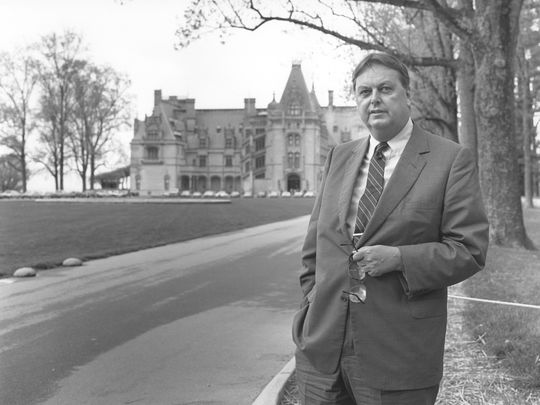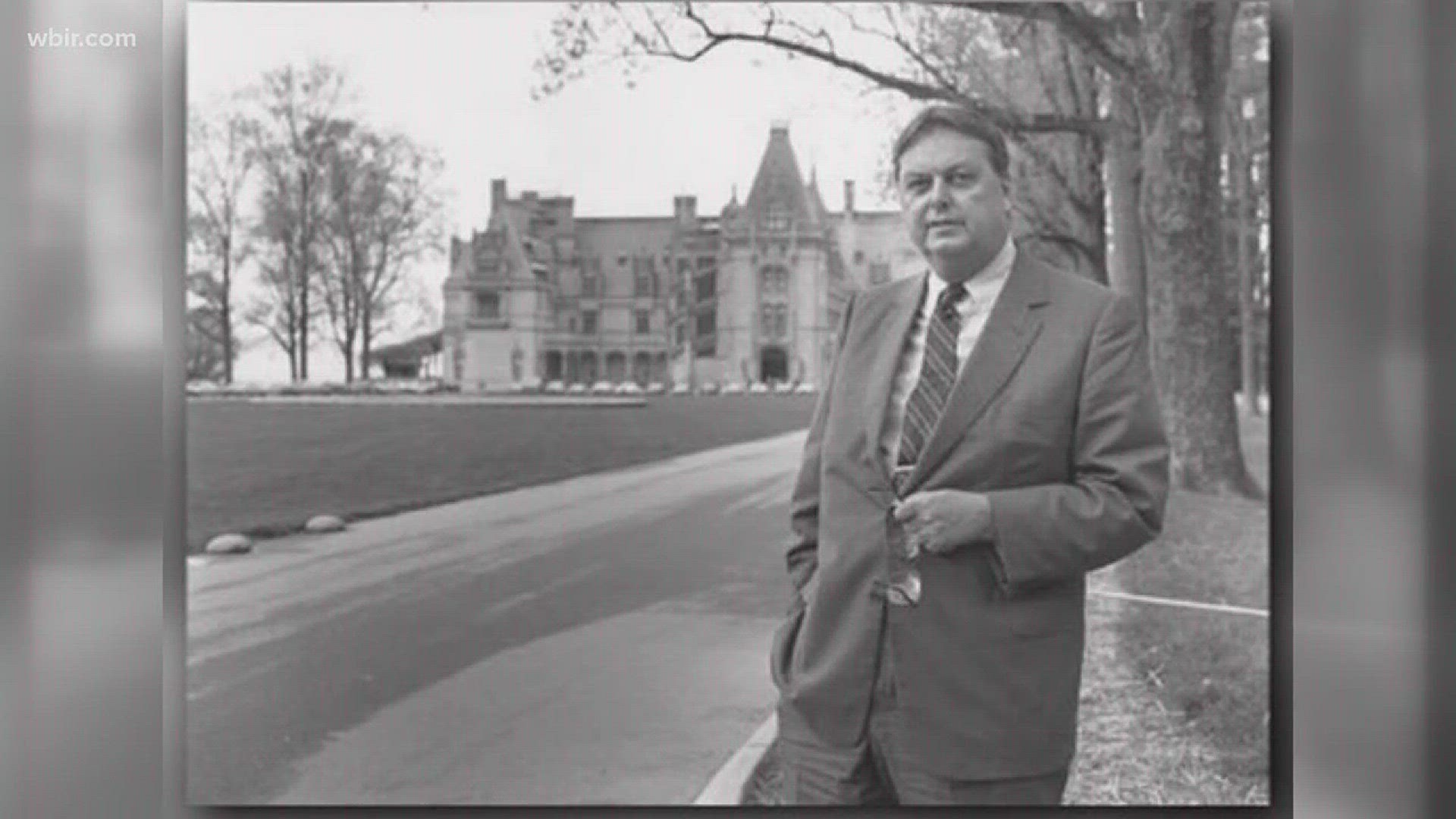When it comes to considering the titans of local tourism and economic development, the name William A.V. Cecil might not top everyone's list.
But it most definitely should, according to industry experts and those who worked closely with Cecil. The owner of the Biltmore Estate and the grandson of estate founder George Washington Vanderbilt III, Cecil died Tuesday at 89.
Cecil ran the estate from 1960-1995, when he gave up daily operations. He remained active with the Biltmore Co. though, serving as chairman of the company's board of directors until his passing.
The legacy of Cecil, the company's chief visionary, is hard to overstate.
"I can’t overemphasize that Western North Carolina has not given Bill Sr. the credit he deserves, in my opinion," said Glenn W. Wilcox, Sr., 85 and the founder of Wilcox World Travel, an Asheville-based travel agency. "He was all about the estate — but also all about Western North Carolina — and how we can make our area a better place to live."
Cecil returned to Asheville in 1959 after graduating from Harvard University and working in finance for Chase Manhattan Bank in Washington, D.C., and New York City. At the time, the Biltmore Estate, a 250-room French chateau completed in 1895, was open to the public but hemorrhaging some $250,000 a year because of high operating expenses and a heavy tax burden.
Even in the early 1970s, the estate struggled. The long-running Biltmore Dairy business had always been self-sustaining, but the estate struggled to make ends meet.
Back then, it had just 100 employees. Today, the estate has more than 2,400 workers, depending on the season, and it remains the top reason tourists come to the Asheville area.
The Biltmore Co., still family-owned and operated, estimates the estate generates $1 out of every $5 in economic impact resulting from tourism in Buncombe County.
Not always thriving
It's hard for people to imagine today that the estate was anything other than a tourist magnet, said Elizabeth Sims, who worked in marketing for the estate from 1990-2008 and contracted with Biltmore for three years before that.
Biltmore now brings in some 1.4 million visitors annually to tour the stately mansion and 8,000 acres of manicured grounds and woods.
In 1960, when Cecil returned to Biltmore, the estate had 64,000 visitors a year. When he retired in 1995, visitation had grown to over 800,000
"I remember when we hit 200,000 visitors a year, and that was a really big deal," Sims said Wednesday. "Mr. Cecil was a consummate marketer. He thought about marketing all the time."
Sims recalls pitching stories to New York editors in the late 1980s, telling them of the fantastic castle nestled in North Carolina's Blue Ridge mountains.
"Nobody would believe me," said Sims, who runs her own marketing company.
They do now.
The Explore Asheville Convention & Visitors Bureau commissioned a report that found in 2016 the Asheville area brought in 10.9 million visitors, and they spent $1.9 billion.
The Biltmore Co. notes their commissioned research has found Biltmore accounted for 23 percent of the tourism industry’s economic impact in Buncombe County from July 2015 through June 2016.
Cecil knew the tourism success of the area and the estate were intertwined. He also had a clear vision for the estate to become a self-sustaining, economically viable operation that turned a profit but also preserved the rich history of his grandfather's vision.
Willing to try new ventures
Steve Miller, a former vice president at the estate, spent 30 years working for Cecil, leaving in 2011 to teach in college and start his own company. He said Cecil had a philosophy of preservation but also incorporated what Miller calls "dynamic authenticity."
"He treated it as if Mr. Vanderbilt was still here," Miller said. "If it wasn't consistent with his grandfather's vision for the property, he wouldn't do it. But he wasn't afraid to try something new."
Vanderbilt completed the home in 1895 but died in 1914 in Washington, D.C., from complications from an appendectomy. William A.V. Cecil was the youngest son of Cornelia Vanderbilt Cecil and John Francis Amherst Cecil.
Cornelia Vanderbilt opened the estate to the public in 1930, in part because of a request from Asheville leaders who hoped to stimulate the economy during the Great Depression.
William A.V. Cecil took over operations three decades later, inheriting what was on the verge of becoming a white elephant. Instead of selling or subdividing the property, Cecil remained doggedly determined to make the property work.
John "Jack" Stevens, 84, worked for Cecil as his attorney for three decades, becoming a personal friend. He describes Cecil as "intensely entrepreneurial," an "eternal optimist" who obsessed over the smallest details while always keeping the faith "that things would work out."
"He had a unique relationship with the people who worked at the estate," said Stevens, 84. "In the old days, he used to get in his car and tour the house and the grounds every day. He generally knew the first names of the people he encountered every day, and he worried about them and their lives."
Stevens laughed at part of the memory — Cecil thought he was surprising his workers, but they were pretty good at knowing when he was coming.
It was also "vitally important to him" to make the estate successful and keep it privately owned.
"It may be anchored in the fact that he was raised in England, and he understood so thoroughly the way so many people in England view the land and estates and the importance of retaining them," Stevens said. "He did feel very strongly that it was the obligation of estate owners to protect and preserve the property."
The Biltmore Winery, opened in 1985, is just one example of Cecil's entrepreneurial spirit and doggedness. One spring a freeze wiped out the estate's grape crop, Stevens said, and Cecil responded by taking a couple of his top executives to France to see how they handled such setbacks, with an eye toward moving onward.
Asked what Asheville might look like without Cecil's influence, Stevens said it's hard to imagine it becoming the thriving, regional draw it is today.
"I think he ignited a spark, a latent capability in Asheville that might never have occurred if he had not come back here in 1959 and said, 'This is something I want to do, this is something I can do and I’m going to figure out a way to do it,'" Stevens said.

A huge ripple effect
Obviously, Cecil wanted success for his family estate, but he also was not afraid to fail.
"Most people don't realize Mr. Cecil was the consummate entrepreneur, despite the fact that he inherited the largest home in America, and that came with a family name very much based on wealth," said Chris Cavanaugh, a tourism business consultant and founder of Magellan Strategy Group. "But they don't realize he was that consummate entrepreneur, and in part he had to try a lot of different things to preserve Biltmore as a private entity."
Cecil licensed the Biltmore name for products that could be marketed, creating a new revenue stream. He also tried various agricultural enterprises, including raising trout and freshwater prawns on the western side of the estate.
Those went by the wayside, but today the estate raises beef and lamb for its own restaurants, as well as fruits and vegetables.
"He was 'farm-to-table' before 'farm-to-table' was cool," said Cavanaugh, who also worked in marketing at the estate from 1995-2004.
At 8,000 acres, the estate is home to multiple restaurants and eateries, two hotels and Antler Hill Village, a retail and restaurant hub.
Cavanaugh said it has essentially become its own city, not only drawing employees from throughout the region and the country but also stimulating other local businesses.
A 2016 study by Tourism Economics measured the economic impact of Biltmore’s businesses. It tallied the impacts of Biltmore operations and off-site spending by Biltmore visitors, including direct, indirect, and induced impact, finding:
• From July 2015-June 2016, Biltmore generated 6,755 jobs in the Asheville area (direct employment of 2,400 and indirect employment in local businesses), and $238 million in labor, for a total impact of $583.2 million.
• Biltmore companies paid $86.2 million in federal, state and local taxes.
Cavanaugh also noted the Cecil bought the Biltmore Co. headquarters building in downtown Asheville. The former Akzona Building is centrally located next to Pack Square Park, and Cecil wanted his company to have a very obvious presence in his hometown.
The hub of the wheel
The reach of Cecil's influence extended far beyond Asheville. He saw a need to market the estate — and Asheville — not just regionally, but nationally and even internationally.
Todd Morse, whose family owned and operated Chimney Rock Park in Rutherford County for decades, said Cecil became a mentor to him when Morse took over the family business at the relatively tender age of 26. Cecil and Hugh Morton, who owned Grandfather Mountain Park in the northeastern mountains of North Carolina, shared their wisdom and tourism expertise to help Morse make a go of his family's 1,000-acre park.
Morse, 57, sold the park to the state of North Carolina in 2007.
"For all those years I know Chimney Rock considered itself a spoke of Asheville's wheel, and Asheville would not have been the wheel without Mr. Cecil and the Biltmore Estate," Morse said. "We all benefited from his leadership and vision."
Morse said when he got to Chimney Rock, they all loved the place and its rugged beauty, but no one had a great handle on "how to make it a sustainable, viable business." That was one part of the business that made it fun for Morse, and what made him admire what Cecil was able to do.
It's absolutely vital for a business to grow to survive, and owning a historically or ecologically sensitive property can make that very difficult.
"A lot of people think (Cecil) was just handed over this gift with no challenges to it, but if you read the estate history, he was handed over a real challenge and rose to it," Morse said. "It's always a challenge to add a new product or grow a new part of the business and stay true to the original business and who you are. Mr. Cecil and the Cecil family have done a fabulous job of that."
A private funeral for family, friends and close associates will take place at 11 a.m. Nov. 3 at All Souls Cathedral in Biltmore Village, followed by a private family burial. A reception will follow 2-5 p.m. at Deerpark on Biltmore Estate.
In lieu of flowers, memorial donations may be made to the “Building Preservation Fund” at All Souls Cathedral, 9 Swan St., Asheville, NC 28803.

